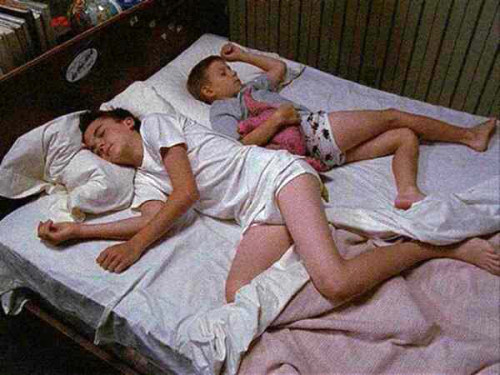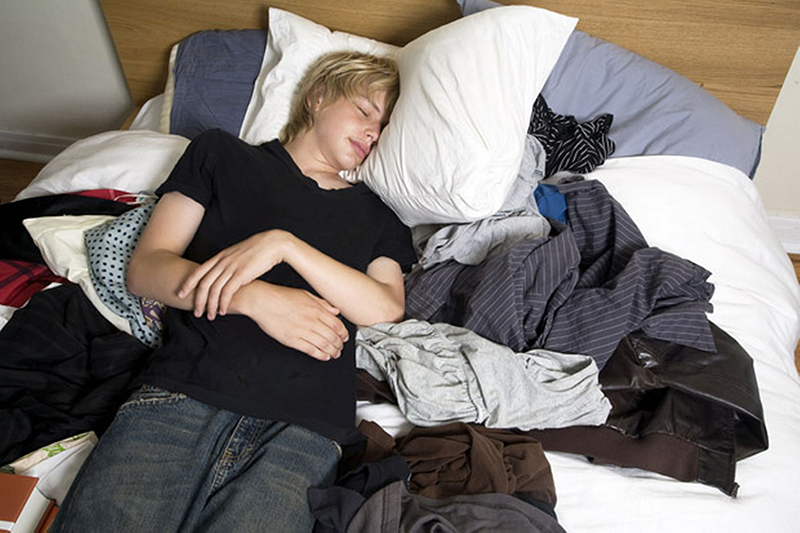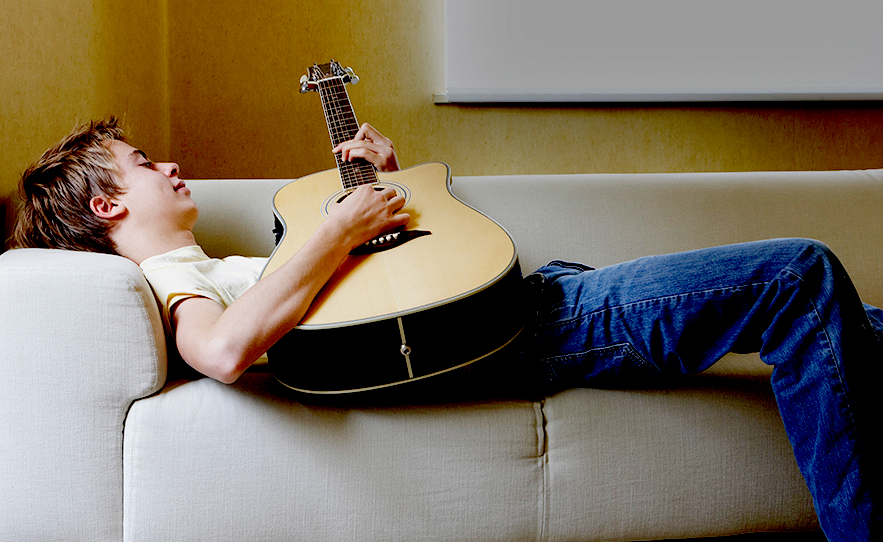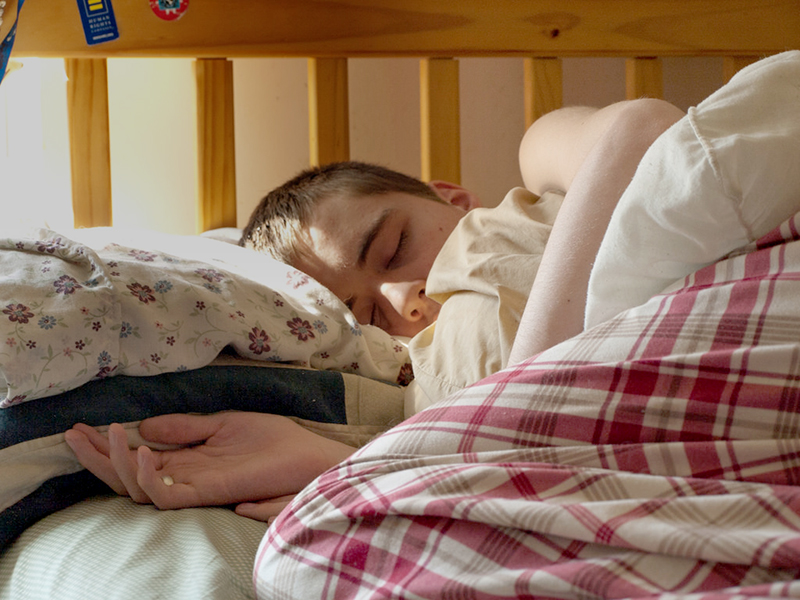Sleep In Teenagers
Right from birth it seems that tired children can crash to sleep anywhere, anytime they are tired. That’s all over in “teenhood” however, partly because all of the nervous system changes occurring with puberty.
Malcolm In The Middle stars Malcolm and Dewy asleep in their shared bedroom
At puberty, the neurological sleep patterns we measure on EEG machines begin to look more “adult” in nature – and we all know how tough it is for us to get a full night of refreshing sleep.
Sleep Habits For Teens
Teens in large part have the same pressures and stresses as adults; although, most of them are being experienced for the first time without established coping mechanisms.
Motivations and priorities are different of course and the portion of their brains which deal with command/control and consequences won’t fully mature until their twenties; but, they even have a word now to define much of their reasoning for what they do: FOMO – Fear Of Missing Out. We had it too. We just didn’t have an acronym for it.
All these stressors can greatly disrupt their sleep, with FOMO being the most common. There are, however, several simple steps to take which will help you all sleep better … even as soon as tonight!
“Habitize” a Regular Sleep Schedule
Those who study martial arts will recognize the teaching: use the opponents movements (like them swinging to hit you) to your advantage (like grabbing their arm and pulling hard forward to flip them). The same can be used to generate sleep – it’s called the circadian rhythm.
The body’s experience with the normal 24 hour light and dark schedule based upon where one lives, sets up an “automatic clock” which drives the secretion of many hormones and body cycles. Regular habits create stronger circadian rhythms which can then be used to one’s advantage in getting the proper amount of sleep.
Getting up and going to bed at the same time every day, even on weekends, helps condition our body to know when to sleep. And, if we do our part, it will respond with a refreshed and alert feeling upon awakening. You should do your best to meet sleep needs every day.
“Comfortize” Your Sleep Space
Birds nest and bears make their dens but the human sleep environment is a bit more complicated than that. If you’re having a difficult time getting to sleep or not feeling refreshed just look around you. Is there another person or animal in your bed with you? Are your street clothes on? Is there a light coming from any electronic gadget? Is the room quiet, dark, cool and comfortable?
Studies show that sleeping in a cool environment is the most conducive to sleep and by eliminating excess noise and light we minimize the distruptions that might wake us up. Bed clothing should be loose fitting, light, non-binding and used only for sleeping. The bedroom should be a place for relaxation and lack of stress.
“Exclusivize” Your Bedroom
Along with “Habitizing” your bedroom it should be “Exclusivized” as well. They are related such that when you enter your bedroom your body should habitually start to prepare for sleep – not for video games, telephones, televisions, indulging pets, doing work and the like.
Along with studies suggesting a cool environment, they also show that noise and even a small glow from a computer screen will erode into the ability to deepen sleep and keep us awake.
Many teens, who have a difficult time sleeping anyway, have managed to morph their bedrooms into multipurpose rooms. Electronics should be removed. In addition to making beeps, whirs and light, if they are there they are tempting to “just check” right before bed which is extremely disruptive to going to sleep.
“Drug-Free Zonify” Your Bedroom
There is heightened sensitivity to stimulants in adolescence. This means that soda pop, tea, coffee and chocolate will keep you awake and when you do finally get to sleep it will be lighter and more fragmented – especially if it makes you get up to pee.
Both nicotine and alcohol fragment sleep; so, none of these things mentioned should be taken within 4-6 hours of bedtime and the last two avoided completely by teens. [For adults, the alcohol “nightcap” may make one drowsy but the resulting sleep fragmentation greatly disrupts the stages of sleep for the night.]
“De-Kitchenize” Your Bedroom
Similarly, eating or drinking anything in the few hours before bed lead to disrupted sleep. Just as significant activity after eating disrupts digestion, digestion disrupts sleep.
Besides leading to substantial weight gain, the act of digestion during sleep greatly predisposes to acid reflux in the supine position. Reflux produces esophageal erosion, heartburn and disrupted sleep in addition to awakenings in order to eliminate.
Dinner or snacks should occur roughly at the same time each day and preferably several hours before going to sleep.
Relaxify Your Bedtime
Heart-rate-raising exercise during the day is one of the best things you can do to get a great nights sleep; unless, it’s within 4 hours of bedtime.
The metabolites of significant muscle activity are initially stored in the body until they can be re-cycled into energy compounds for the next day. Sleep is where much of this re-cycling occurs so exercise is a good “driver” toward sleep.
Muscular activity too close to bedtime however, leaves much of the epinephrine and other stimulating factors the body produces, rattling around your nervous system to counteract any attempt at sleeping. You are still way too revved up to sleep.
Wind Downify Your Evening
Much like relaxifying the hours leading up to sleep they need to be “wind downified” too. Neurological exercise, like computing or DVD watching, can do the same thing as physical exercise (wind you up too much for sleep) only more insidiously.
Remember when I mentioned the circadian rhythm and hormones? Well, one of them is called melatonin which, when it increases in level, induces a calmness and feeling of well being which obviously is designed to help with sleep.
There are two issues with melatonin. One which effects everyone and one which relates to teens. First, the body’s level of melatonin peaks each evening in response to diminished light (i.e. darkness). That’s why it goes up at night after the strong light of day begins to wane and why lights in rooms in the hour before bed need to be subdued.
Second, for some reason (probably puberty) there is a significant lag in the secretion of melatonin in teens once the sun goes down. That means restfulness doesn’t begin or end as early – tired later, awaken later. That’s why there’s a movement afoot to obtain later school start times for teens. Actually, beginning the “dewind” earlier would probably do just as well once the habit had become circadian.
That means, for teens, an hour before bed you should begin the night’s bed rituals: shower, lowered lights, night clothes. Ditch the TV, Internet, Phone, eBooks, rousing music etc. in favor of relaxing music, reading a book etc.. Yea, I know this one will be a bit of a stretch.
This time to unwind will mentally prepare you for sleep. As our eyes register the onset of darkness, melatonin is produced and sleepiness is triggered.
“DeNapify” Your Day
We have a concept known as “sleep drive” which is the intensity that the body wants to fall asleep. The longer we stay awake, the more we want to go to sleep.
By taking a nap the sleep drive is relieved but we’ll also have a harder time getting to sleep later. If for some unavoidable reason sleep is substantially delayed one night, the drive isn’t adequately relieved by sun up the next day and the tendency will be to take a nap when possible. If you do, the drive won’t be enough the next night… and you can see a vicious cycle will begin.
Adults should have a consolidated period of sleep at night without additional naps. If there is excessive daytime sleepiness and desire to nap, in spite of adequate sleep time, this might suggest a sleep disorder warranting further evaluation.
“Prioritize” Your Sleep Time
You’ve just got to remember how important sleep is to your health. Your body, your school, your work, your mind – everything about you suffers when you don’t get adequate sleep. Make sleep one of your priorities in your teen years. Don’t sacrifice sleep to do daytime activities. You’re smart enough to figure out how to still have just as fulfilling a life during the day and leave the night for sleeping.
Opportunities to engage in pleasurable activities – visiting friends, watching television, playing on the internet, eating out, and any number of others – quickly cut into our sleep time if we allow them to. It’s important to schedule your sleep time and stick to that schedule, no matter what might come up during the day.
Sleep loss is associated with gaining weight and there are certain sleep disorders that may first appear in the teenage years – sleep apnea, narcolepsy, and circadian rhythm disorders. If you are having trouble sleeping at night, or are feeling too tired during the day, it is important to get medical help.
Dealing With Difficulty Sleeping
Prolonged difficulty falling asleep, as occurs with insomnia, might begin the habit of thinking the bed and bedroom is a place for difficulties. If this is a frequent occurrence you’ll need to troubleshoot why by going through all the above sleep tips to see if you’re missing any. But don’t do it at night while you’re struggling for sleep.
There are immediate things you need to do this night to obtain sleep. First, assess what you’re thinking about and if it’s stressful and non-productive then clear your mind intentionally.
Then take an assessment of your muscles. Are any of them tense? If so, intentionally cause each specific muscle to relax to it’s fullest. Most often you’ll realize that there is tension and willing any muscle to go limp will noticeably have an effect. And, once relaxed, you can often cause it to go another step and relax even further a second time.
You can even go through an inventory of your muscles one by one from top to bottom willing each one in turn to relax against the bed until you’re either completely and totally relaxed – or asleep.
This is the very approach used in things like self-hypnosis and yoga meditation. It really works!
If you’re still struggling within 15 minutes, sometimes it helps to get up, go to the bathroom, swish your mouth out with water and then go back and tuck yourself into a good sleep position in bed again.
Some people find that going into another quiet place and lying down in the dark without any other stimulus until they feel ready to fall asleep helps. When feeling tired they can then return to their bed to sleep without worrying their own bedroom will garner bad associations with difficulties.
And obviously, if this more than a rare occurrence you should discuss it with your doctor to see if there is anything more serious wrong.
7 Posts in Children's Sleep (sleep) Series
- Sleep in Toddlers, Older Children – 28 Feb 2023
- More sleep training and tips, Infants - Part 2 – 11 Mar 2016
- Sleep Expectations and Training, Infants – 6 Mar 2016
- Sleep In Teenagers – 28 Jan 2016
- How much sleep – 20 Jan 2016
- Bedtimes and Children's Thinking Ability – 14 Aug 2013
- Children's Sleep series: Intro/Index – 13 Aug 2013
Advertisement by Google
(sorry, only few pages have ads)





